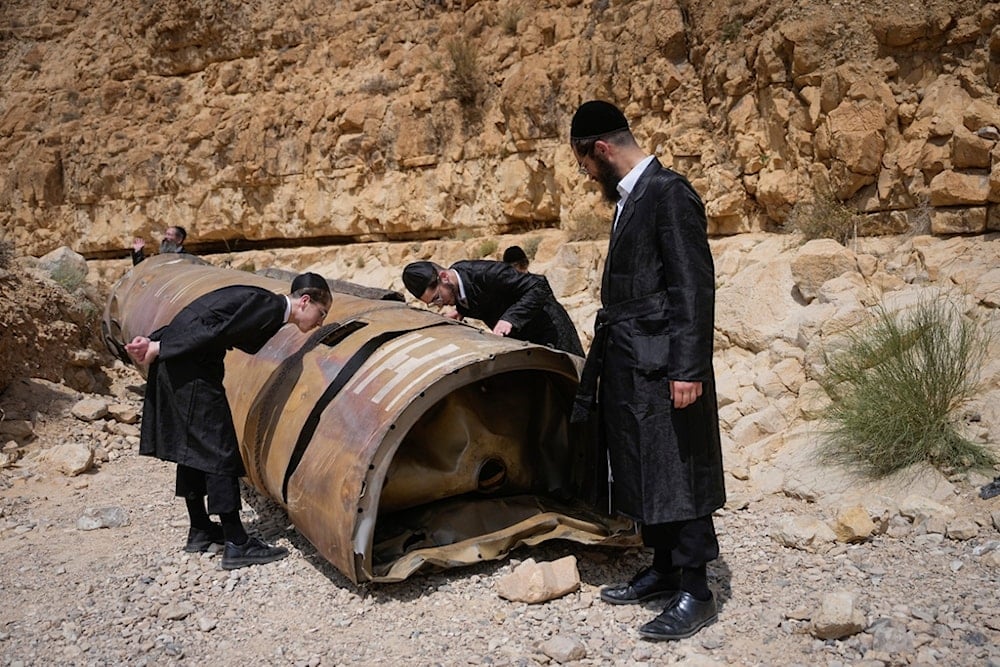'Israel' isolated, operating alone ahead of Iranian response: WaPo
The Washington Post highlights that Arab states are seeking to distance themselves publicly from any future interference in repelling an attack on "Israel".
-

Israelis inspect the debris of what is believed to be an intercepted Iranian missile near the city of Arad, southern occupied Palestine, Sunday, April 28, 2024. (AP)
As the Israeli occupation entity anticipates a potential retaliatory strike from Iran following the assassination of Hamas Political Bureau chief Ismail Haniyeh in Tehran, concerns are mounting over one of its key defense mechanisms - a US-led Arab coalition that played a pivotal role in countering the last Iranian attack, The Washington Post reported.
The coalition, which included Jordan, Saudi Arabia, and the United Arab Emirates, became publicly known on April 13, when it assisted "Israel" in intercepting drones and missiles launched from Iran in response to the Israeli aggression on its consulate in Damascus.
At the time, "Israel’s" military chief praised the collaboration as opening "new opportunities for cooperation in the Middle East," while White House National Security Advisor John Kirby highlighted that it sent "a strong message about where Israel is in the region versus where Iran is in the region."
However, four months later, "Israel" finds itself more isolated in the region, a situation that military analysts warn could increase its vulnerability, The Washington Post pointed out, adding that even with US support, there are growing concerns that Israeli air defense systems may struggle to repel a massive, coordinated attack.
The report highlighted that in April, Arab countries played down their involvement in repelling the Iranian attack, cautious of Tehran's retaliation and reluctant to appear aligned with "Israel" amid widespread public anger over the Palestinian casualties in the Gaza Strip.
Now, Arab states are also seeking to distance themselves publicly from any future interference.
Jordan and Saudi Arabia have explicitly stated they do not want their airspace to become a battlefield, while Egypt has declared it will not participate in a military axis to repel an Iranian attack.
These public declarations are "very disturbing," the newspaper quoted a senior Israeli politician who helped establish the regional coalition as saying.
Speaking anonymously due to the sensitive nature of the issue, he noted that while Arab states within missile range are keen on containing Iran, their ties with "Israel" are fragile and have only been tested on a large scale once before.
Facing the prospect of all-out war, the politician admitted that "Israel is operating quite alone."
This comes despite Kirby telling reporters on Wednesday that US President Joe Biden had "ordered additional military resources to the region to make sure that, should Israel be attacked, that the United States can ably come to her defense."
The Washington Post recalled that Iran's April retaliatory attack was well-coordinated, allowing "Israel" and its allies enough time to prepare.
Officials now fear the next attack could be more sudden, larger in scale, and longer-lasting, potentially spanning several days and involving coordinated strikes from multiple directions such as Iraq, Yemen, Syria, and Lebanon.
Last week, "Israel" assassinated top Hezbollah commander Sayyed Fouad Shokor (Hajj Mohsen) in an airstrike in Haret Hreik, the Southern Suburb of Beirut, hours before it assassinated Haniyeh in the Iranian capital.
The Lebanese group's Secretary-General Sayyed Hassan Nasrallah vowed Wednesday that Hezbollah's response to Hajj Mohsen's assassination "is coming, and it will be strong, impactful, and effective."
The Washington Post noted that in addition to low-flying, high-speed one-way drones, the group may use long-range munitions, which it claims to possess but has not publicly demonstrated.
According to the report, repelling such an assault would likely be costly for "Israel", with Iron Dome interceptions estimated at $30,000 per interception and the Arrow 3 system, designed for ballistic missiles, costing around $3 million per interception.
"Israel" believes that Hezbollah will initiate the attack, possibly targeting Tel Aviv with guided missiles, according to Yoel Guzansky, a senior researcher at the "Institute for National Security Studies" in Tel Aviv.
Israeli media reported on Monday that Israeli occupation Prime Minister Benjamin Netanyahu met with his security chiefs to discuss the possibility of a preemptive strike against Iran if an attack appears imminent.
"That’s something that we haven’t gotten to yet, but the future is yet to come," confirmed the senior Israeli politician.
The newspaper highlighted that Gen. Michael E. Kurilla, head of US Central Command, visited "Israel" for the second time this week to discuss military coordination.
It mentioned that newly deployed US assets include a squadron of F-22 Raptors, naval cruisers and destroyers, and the aircraft carrier USS Abraham Lincoln and its accompanying ships, which are en route to the Middle East to replace another carrier strike group set to depart the region.
Touching on the matter, Israel Ziv, a retired major general who served as the head of the Israeli military's Operations Division, suggested that "the U.S. is much busier than it was in April, but it also realizes that a regional war will affect the economy, and it is in their interest to stop the escalation."
However, Ziv cautioned Israeli leaders against assuming that American support is guaranteed, adding that there is a risk in assuming that the US will always provide its assets if "Israel" enters a regional war.
He also predicted difficulties in maintaining the regional coalition, since not all members are prepared to cooperate with Netanyahu.
In the same context, Abdullah al-Junaid, a political analyst in Bahrain, considered that Gulf states remain committed to partnering with "Israel" to contain Iran.
However, he stressed that any long-term alliance would require progress on resolving the Israeli-Palestinian strggle, an issue that Netanyahu and his far-right allies have so far refused to address. Al-Junaid explained that their reluctance has stalled US-backed efforts to expand normalization agreements between "Israel" and other Arab states, including Saudi Arabia.
Read more: 'Israel' in nerve-wracking anticipation for Hezbollah, Iran response

 6 Min Read
6 Min Read








